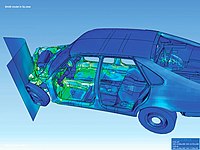
Photo from wikipedia
The International Maritime Organization stipulates that greenhouse gas emissions from ships should be reduced by at least 50% relative to the amount observed in 2008. Consequently, the demand for liquefied… Click to show full abstract
The International Maritime Organization stipulates that greenhouse gas emissions from ships should be reduced by at least 50% relative to the amount observed in 2008. Consequently, the demand for liquefied natural gas (LNG)-fueled ships has increased significantly. Therefore, an independent type-C cylindrical tank, which is typically applied as an LNG fuel tank, should be investigated. In this study, structural integrity assessments using finite element analysis are performed on C-type LNG fuel tanks for a sea-cleaning vessel. In addition, the applicability of stainless steel and aluminum alloys is evaluated for LNG tank construction. Structural analyses and fatigue limit evaluations, including heat transfer analyses for the tank based on IGC code requirements, are performed, and the results are compared. The results of this study are expected to facilitate the selection of materials used for independent type-C tanks.
Journal Title: Metals
Year Published: 2021
Link to full text (if available)
Share on Social Media: Sign Up to like & get
recommendations!